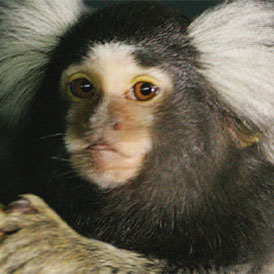One-in-ten monkey experiments ‘unjustified’
Almost one-in-ten experiments performed on monkeys in Britain are found to be failing to produce a medical benefit to humans. Scientists call for a review of the effectiveness of such research.
The report of a 10-year commission of inquiry into experiments has concluded that nine per cent of those studied had “inadequate or insufficient” grounds to justify the work.
Prof Sir Patrick Bateson, who chaired the commission, told a news conference: “These projects were unlikely to be beneficial and the claims made for them were implausible.
“In my view, the funding of work on non-human primates should not be continued if no effort has been made to demonstrate plausibly the potential medical and social benefits of the work.”
But the commission, which studied experiments carried out on almost 3,000 monkeys in the period from January 1997 to December 2006, found that 91 per cent of those experiments were justified and beneficial to humans. It said the practice should continue, with improved screening.
Tests on chimpanzees and other great apes are already banned in Britain and the proportion of monkeys used in research – compared to other animals – is just one in a thousand.
“It is still far too easy to subject primates to experiments that have a devastating impact on them with little or no human benefit.” Michelle Thew, BUAV
But animal welfare campaigners – and some scientists – are concerned about any use of primates in scientific research.

Primatologist Ian Redmond told Channel 4 News: “Monkeys bred in captivity are still genetically wild monkeys. They are only one or two generations away from living in the forest.
“So even if their development has been in deprived conditions of captivity, their genes are trying to express themselves in a way that they can’t in captivity, so I think that does cause an effect and perhaps we don’t know enough about that effect.”
‘Chilling insight’
The British Union for the Abolition of Vivisection (BUAV), which campaigns for an end to primate research, described the commission’s report as “chilling”.
BUAV chief executive Michelle Thew said: “This report is a chilling insight into primate research in the UK. It is also a shocking admission of failure.
“Regulations designed to give special protection to primates in research are failing. It is still far too easy to subject primates to experiments that have a devastating impact on them with little or no human benefit.”
Research using primates has led to developments of a vaccine for polio, safer organ transplants and revolutionary “deep brain stimulation” for patients suffering from Parkinson’s Disease.
But the report found a few instances of research which caused a high degree of suffering to the animals involved but which was not judged to be the highest-quality science. One example quoted involved UK-funded research carried out abroad, training students to perform a hysterectomy, which “compromised” both the animal and its foetus.
The commission ruled that overseas research should only be funded if it complied with UK standards.
It also recommended the establishment of a new body to establish whether commissioned research would lead to improvements in healthcare and that the results of all such research should be published – even if it was unsuccessful – to help regulate whether it should be repeated in future.




